kahf surah Transliteration is a significant chapter in the Qur’an, known for its narrative style, surah al kahf in english focusing on stories like the Companions of the Cave surah al kahf, the story of Prophet Musa (Moses) and Khidr, the tale of Dhul-Qarnayn, and the parable of two men. These stories convey powerful lessons about perseverance in faith, the tests of life, the importance of knowledge, and the ultimate accountability in the Hereafter surah kahf translation. And in Arabic-om.com you can also read Surah Al Mulk in English transliteration, Every day in the night.
Surah Al Kahf:
Reading Surah Al-Kahf brings light to your week and protection to your soul.
Let its stories inspire your heart to trust Allah’s plan.
Keep Arabic-OM.com in your heart and your browser; come back every Friday.
kahf surah Transliteration
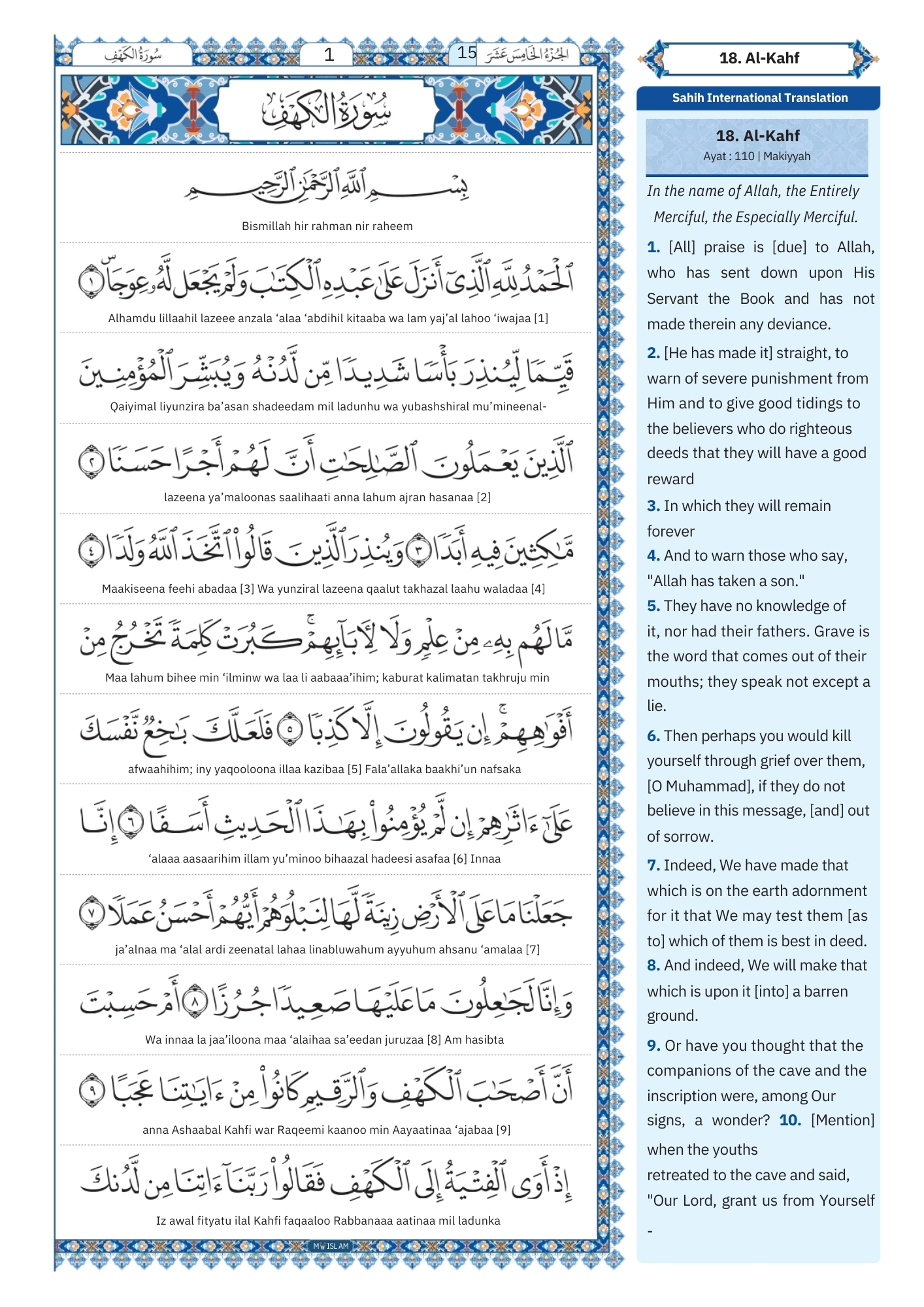
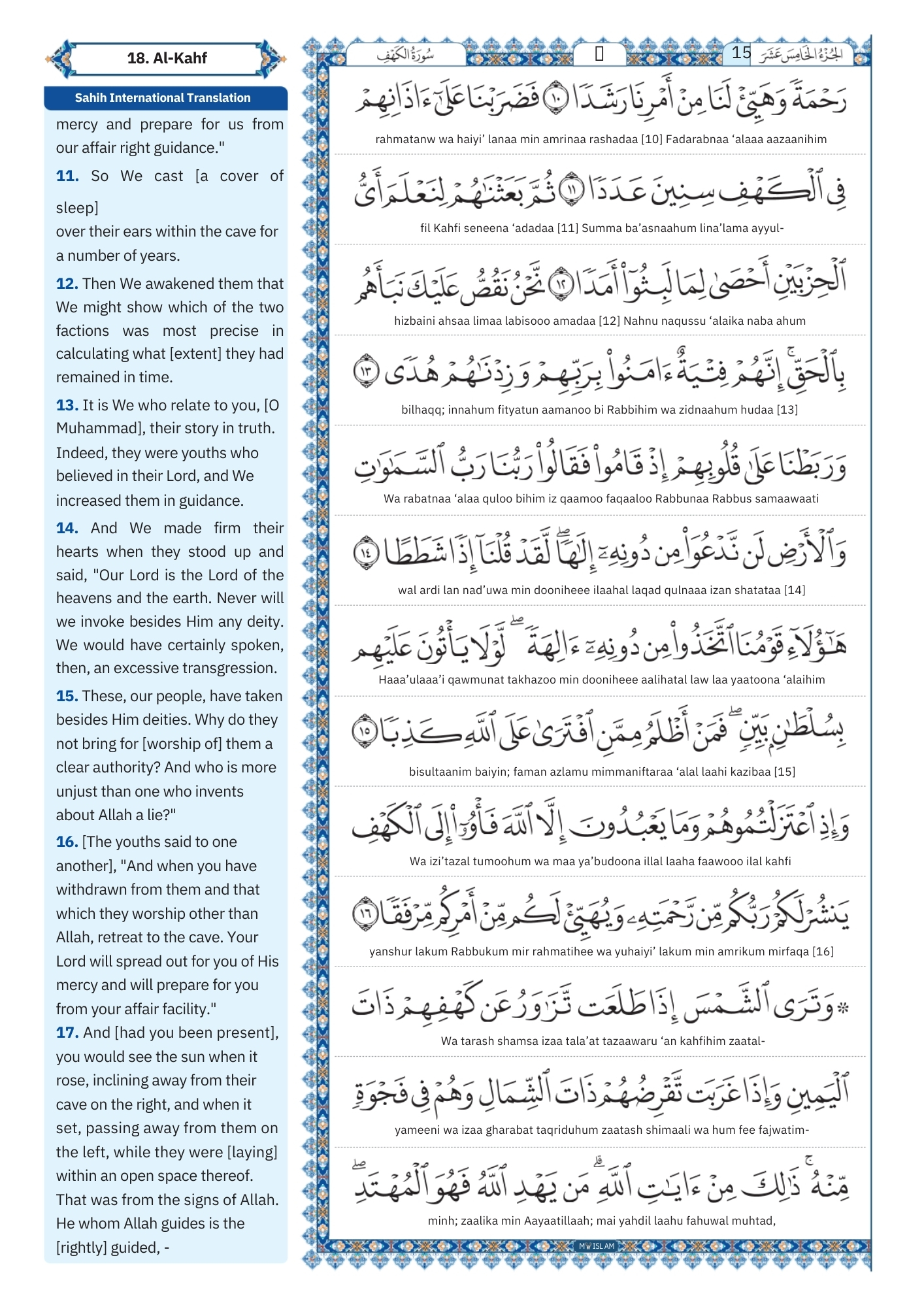

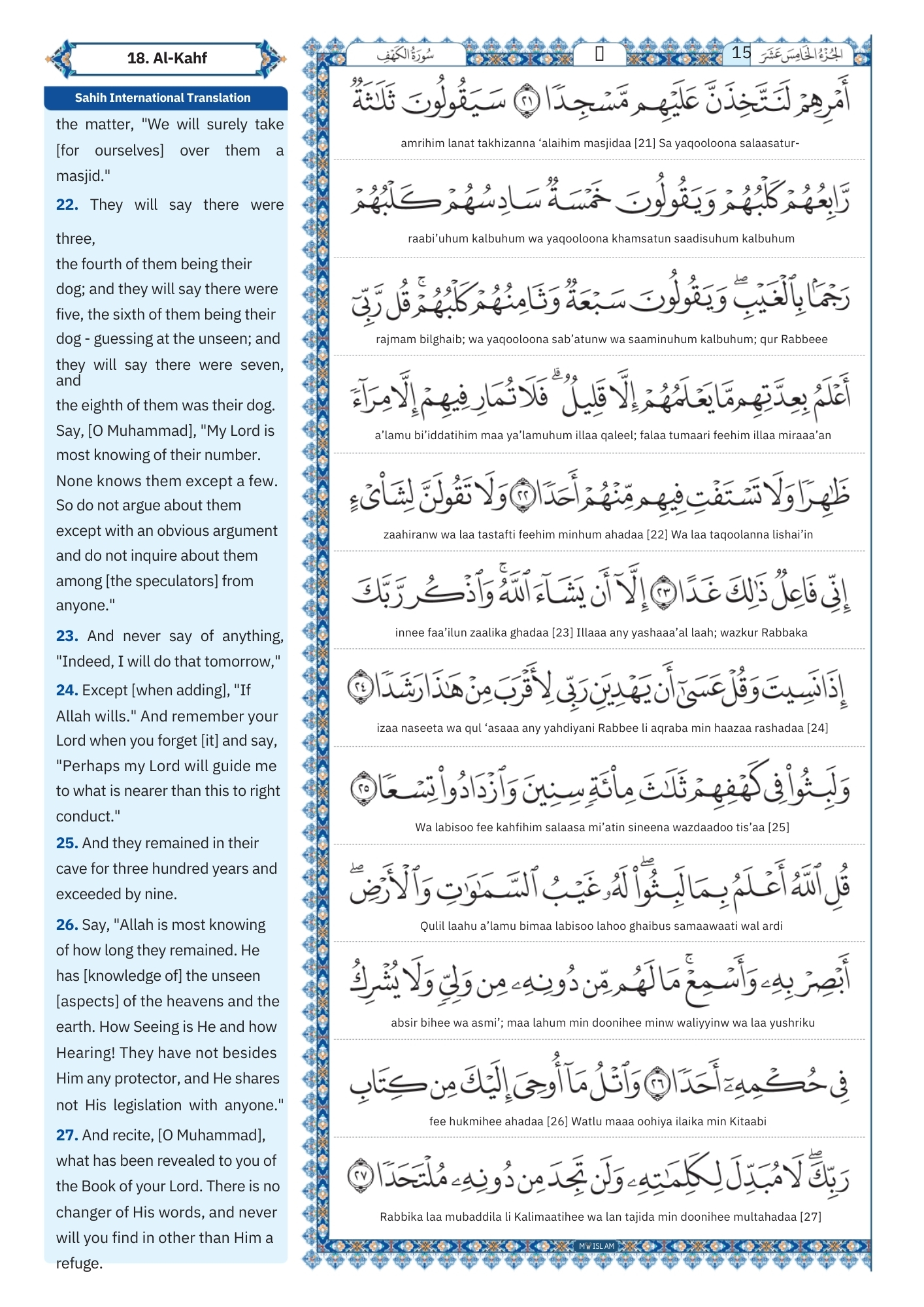



kahf surah Transliteration (7) surah al kahf in english





kahf surah Transliteration: surah al kahf in english
أَعُوذُ بِاللَّهِ مِنَ الشَّيْطَانِ الرَّجِيمِ
Aʿūdhu billāhi mina ash-shayṭāni ar-rajīm
I seek refuge in Allah from the accursed Satan
بِسْمِ اللَّهِ الرَّحْمَـٰنِ الرَّحِيمِ
Bismillāhir-raḥmānir-raḥīm
In the name of Allah, the Most Gracious, the Most Merciful
1.
Al-ḥamdu lillāhi alladhī anzala ʿalā ʿabdihi al-kitāba wa lam yajʿal lahu ʿiwajā
Praise be to Allah, who has sent down upon His Servant the Book and has not made therein any deviance.
2.
Qayyiman liyundhira ba’san shadīdan min ladunhu wa yubashshira al-mu’minīn
[He has made it] straight, to warn of severe punishment from Him and to give good tidings to the believers
الَّذِينَ يَعْمَلُونَ الصَّالِحَاتِ أَنَّ لَهُمْ أَجْرًا حَسَنًا
Alladhīna yaʿmalūna aṣ-ṣāliḥāti anna lahum ajran ḥasanā
Who do righteous deeds, that they will have a good reward
3.
Mākithīna fīhi abadā
In which they will remain forever
4.
Wa yundhira alladhīna qālū ittakhadha Allāhu waladā
And to warn those who say, “Allah has taken a son.”
5.
Mā lahum bihi min ʿilmin walā li-ābā’ihim
They have no knowledge of it, nor do their forefathers
Kaburat kalimatan takhruju min afwāhihim
Grave is the word that comes out of their mouths
In yaqūlūna illā kadhibā
They speak not except a lie
6.
Falaʿallaka bākhiʿun nafsaka ʿalā āthārihim
Then perhaps you would kill yourself through grief over them
In lam yu’minū bihādhā al-ḥadīthi asafā
If they do not believe in this message, [out of] sorrow.
7.
Innā jaʿalnā mā ʿala al-arḍi zīnatan lahā
Indeed, We have made that which is on the earth adornment for it
Linabluwahum ayyuhum aḥsanu ʿamalā
That We may test them [as to] which of them is best in deed
8.
Wa innā la-jāʿilūna mā ʿalayhā ṣaʿīdan juruzā
And indeed, We will make whatever is on it [into] a barren ground.
9.
Am ḥasibta anna aṣḥāba al-kahfi war-raqīm
Or have you thought that the companions of the cave and the inscription
Kānū min āyātinā ʿajabā
Were among Our wonderful signs?
10.
Idh awā al-fityatu ilā al-kahfi faqālū
[Mention] when the youths retreated to the cave and said,
Rabbana ātinā min ladunka raḥmah
“Our Lord, grant us from Yourself mercy
Wa hayyi’ lanā min amrinā rashadā
And prepare for us from our affair right guidance.”
11.
Fa-ḍarabnā ʿalā ādhānihim fī al-kahfi sinīna ʿadadā
So We cast [a cover of sleep] over their ears within the cave for a number of years.
12.
Thumma baʿathnāhum li-naʿlama ayyul-ḥizbayni aḥṣā limā labithū amadā
Then We raised them up that We might know which of the two parties was most precise in calculating the time they had remained.
13.
Naḥnu naquṣṣu ʿalayka naba’ahum bil-ḥaqq
We relate to you their story in truth.
Innahum fityatun āmanū birabbihim wa zidnāhum hudā
Indeed, they were youths who believed in their Lord, and We increased them in guidance.
14.
Wa rabaṭnā ʿalā qulūbihim idh qāmū fa-qālū
And We made firm their hearts when they stood up and said,
Rabbunā rabbu as-samāwāti wal-arḍ
“Our Lord is the Lord of the heavens and the earth.
Lan nadʿuwa min dūnihi ilāhā
We will never invoke any deity besides Him.
Laqad qulna idhan shaṭaṭā
Indeed, we would have spoken an excessive transgression [if we did so].”
15.
Hā’ulā’i qawmuna ittakhadhū min dūnihi ālihah
“These, our people, have taken gods besides Him.
Lawlā ya’tūna ʿalayhim bisulṭānin bayyin
Why do they not bring for worship a clear authority?
Faman aẓlamu mimman iftarā ʿalā Allāhi kadhibā
And who is more unjust than one who invents a lie about Allah?”
16.
Wa idhi iʿtazaltumūhum wa mā yaʿbudūna illā Allāh
“And when you withdraw from them and from what they worship other than Allah,
Fa’ū ilā al-kahfi yanshur lakum rabbukum min raḥmatih
Retreat to the cave – your Lord will spread out for you of His mercy
Wa yuhayyi’ lakum min amrikum mirfaqā
And will prepare for you from your affair facility.”
17.
Wa tarā ash-shamsa idhā ṭalaʿat tazāwaru ʿan kahfihim dhāta al-yamīn
And [had you been there] you would have seen the sun when it rose, inclining away from their cave on the right
Wa idhā gharabat taqriḍuhum dhāta ash-shimāl
And when it set, passing away from them on the left,
Wa hum fī fajwatin minhu
While they lay in the open space thereof.
Dhālika min āyāti Allāh
That was from the signs of Allah.
Man yahdi Allāhu fahuwa al-muhtad
He whom Allah guides is the [rightly] guided,
Wa man yuḍlil falan tajida lahu waliyyan murshidā
But he whom He leaves astray – never will you find for him a protecting guide.
18.
Wa taḥsabuhum ayqāẓan wa hum ruqūd
And you would think them awake, while they were asleep.
Wa nuqallibuhum dhāta al-yamīn wa dhāta ash-shimāl
And We turned them to the right and to the left,
Wa kalbuhum bāsitun dhirāʿayhi bil-waṣīd
While their dog stretched out its forelegs at the entrance.
Lawiṭṭalaʿta ʿalayhim lawallayta minhum firārā
Had you looked at them, you would have surely turned away from them in flight,
Wa lamuli’ta minhum ruʿbā
And been filled with fear of them.
19.
Wa ka-dhālika baʿathnāhum liyatasā’alū baynahum
And similarly, We awakened them that they might question one another.
Qāla qā’ilun minhum kam labithtum
A speaker among them said, “How long have you remained [here]?”
Qālū labithnā yawman aw baʿḍa yawm
They said, “We have remained a day or part of a day.”
Qālū rabbukum aʿlamu bimā labithtum
They said, “Your Lord is most knowing of how long you remained.
Fa-bʿathū aḥadakum bi-wariqikum hādhihi ilā al-madīnah
So send one of you with this silver coin of yours to the city,
Falyanẓur ayyuhā azkā ṭaʿāmā falyā’tikum birizqin minh
Let him look to which food is purest, and bring you provision from it,
Wa l-yatalattaf wa lā yushʿiranna bikum aḥadā
And let him be cautious and not make anyone aware of you.
20.
Innahum in yaẓharū ʿalaykum yarjumūkum
Indeed, if they come to know of you, they will stone you,
Aw yuʿīdūkum fī millatihim
Or return you to their religion,
Wa lan tufliḥū idhan abadā
And then you will never succeed, ever.
21.
Wa ka-dhālika aʿtharnā ʿalayhim li-yaʿlamū anna waʿda Allāhi ḥaqq
And thus We made their case known, so that they would know that the promise of Allah is true,
Wa anna as-sāʿata lā rayba fīhā
And that the Hour – there is no doubt about it.
Idh yatanāzaʿūna baynahum amrahum
[Remember] when they disputed among themselves about their affair,
Faqālū ibnū ʿalayhim bunyānā
And said, “Construct over them a structure.
Rabbuhum aʿlamu bihim
Their Lord knows best about them.”
Qāla alladhīna ghalabū ʿalā amrihim
Those who prevailed in the matter said,
Lanattakhidhanna ʿalayhim masjidā
“We will surely take [for ourselves] over them a place of worship.”
22.
Sayaqūlūna thalāthatun rābiʿuhum kalbuhum
They will say, “They were three, the fourth of them was their dog.”
Wa yaqūlūna khamsatun sādisuhum kalbuhum rajman bil-ghayb
And they will say, “They were five, the sixth of them was their dog” guessing at the unseen.
Wa yaqūlūna sabʿatun wa thāminuhum kalbuhum
And they will say, “They were seven, and the eighth of them was their dog.”
Qul rabbī aʿlamu biʿiddatihim mā yaʿlamuhum illā qalīl
Say, [O Muhammad], “My Lord is most knowing of their number. None knows them except a few.”
Fa-lā tumāri fīhim illā mirā’an ẓāhirā
So do not argue about them except with obvious argument,
Wa lā tastafti fīhim minhum aḥadā
And do not ask [about them] from any among them [for information].
23.
Wa lā taqūlanna lishay’in innī fāʿilun dhālika ghadā
And never say of anything, “Indeed, I will do that tomorrow,”
24.
Illā an yashā’a Allāh
Except [when adding], “If Allah wills.”
Wadhkur rabbaka idhā nasīta
And remember your Lord when you forget [it]
Wa qul ʿasā an yahdiyani rabbī li-aqraba min hādhā rashadā
And say, “Perhaps my Lord will guide me to what is nearer than this to right conduct.”
25.
Wa labithū fī kahfihim thalātha mi’atin sinīna wazdādū tisʿā
And they remained in their cave for three hundred years and exceeded by nine.
26.
Qulillāhu aʿlamu bimā labithū
Say, “Allah is most knowing of how long they remained.
Lahu ghaybu as-samāwāti wal-arḍ
To Him belongs the unseen of the heavens and the earth.
Abṣir bihi wa asmiʿ
How Seeing is He and how Hearing!
Mā lahum min dūnihi min waliyyin
They have not besides Him any protector,
Wa lā yushriku fī ḥukmihi aḥadā
And He shares not His command with anyone.”
27.
Wa’tlu mā ūḥiya ilayka min kitābi rabbik
And recite what has been revealed to you of the Book of your Lord.
Lā mubaddila li-kalimātih
There is no changing His words,
Wa lan tajida min dūnihi multahadā
And never will you find in other than Him a refuge.
28.
Wa-ṣbir nafsaka maʿa alladhīna yadʿūna rabbahum
And keep yourself patient with those who call upon their Lord
Bil-ghadāti wal-ʿashiyyī yurīdūna wajhah
Morning and evening, seeking His face.
Wa lā taʿdu ʿaynāka ʿanhum
And let not your eyes pass beyond them
Turīdu zīnatal-ḥayāti ad-dunyā
Desiring the adornments of worldly life.
Wa lā tuṭiʿ man aghfalnā qalbahu ʿan dhikrinā
And do not obey one whose heart We have made heedless of Our remembrance,
Wa-ttabaʿa hawāhu wa kāna amruhu furutā
And follows his desire and whose affair is ever [in] neglect.
29.
Wa qulil-ḥaqqu min rabbikum
And say, “The truth is from your Lord,
Faman shā’a falyu’min waman shā’a falyakfur
So whoever wills – let him believe; and whoever wills – let him disbelieve.”
Innā aʿtadnā liẓ-ẓālimīna nārā
Indeed, We have prepared for the wrongdoers a Fire
Aḥāṭa bihim surādiquhā
Whose walls will surround them.
Wa in yastaghīthū yughāthū bimā’in kal-muhli
And if they cry for relief, they will be relieved with water like molten brass,
Yashwī al-wujūh
Which scalds the faces.
Bi’sa ash-sharābu wa sā’at murtafaqā
Wretched is the drink, and evil is the resting place.
30.
Inna alladhīna āmanū wa ʿamilū aṣ-ṣāliḥāt
Indeed, those who have believed and done righteous deeds
Innā lā nuḍīʿu ajra man aḥsana ʿamalā
We will not allow to be lost the reward of any who did well in deeds.
31.
Ūlā’ika lahum jannātu ʿadnin tajrī min taḥtihimu al-anhār
Those will have Gardens of perpetual residence beneath which rivers flow.
Yuḥallawna fīhā min asāwira min dhahab
They will be adorned therein with bracelets of gold,
Wa yalbasūna thiyāban khuḍran min sundusin wa istabraq
And will wear green garments of fine silk and heavy brocade,
Muttaki’īna fīhā ʿalā al-arā’ik
Reclining therein on adorned couches.
Niʿma ath-thawābu wa ḥasunat murtafaqā
Excellent is the reward, and good is the resting place.
32.
Wa-ḍrib lahum mathalan rajulayni
And present to them an example of two men:
Jaʿalnā li-aḥadihimā jannatayn min aʿnāb
We made for one of them two gardens of grapevines,
Wa ḥafafnāhumā bīnakhlin wa jaʿalnā baynahumā zarʿā
And We bordered both with palm trees and placed crops between them.
33.
Kiltā al-jannatayni ātat ukulahā wa lam taẓlim minhu shay’ā
Each of the gardens produced its fruit and did not fall short in anything.
Wa fajjarnā khilālahumā nahrā
And We caused a river to gush forth within them.
34.
Wa kāna lahu thamarun fa-qāla li-ṣāḥibihi wa huwa yuḥāwiruh
And he had wealth, so he said to his companion while conversing with him:
Anā aktharu minka mālā wa aʿazzu nafarā
“I am greater than you in wealth and mightier in [numbers of] men.”
35.
Wa dakhala jannatahu wa huwa ẓālimun linafsih
And he entered his garden while he was unjust to himself.
Qāla mā aẓunnu an tabīda hādhihi abadā
He said, “I do not think that this will ever perish.”
36.
Wa mā aẓunnu as-sāʿata qā’imah
“And I do not think the Hour will ever come.
Wa la’in ruddidttu ilā rabbī la-ajidanna khayran minhā munqalabā
And even if I should be brought back to my Lord, I will surely find better than this as a return.”
37.
Qāla lahu ṣāḥibuhu wa huwa yuḥāwiruh
His companion said to him while conversing:
Akafarta billadhī khalaqaka min turāb
“Have you disbelieved in the One who created you from dust,
Thumma min nuṭfah thumma sawwāka rajulā
Then from a sperm-drop, and then fashioned you into a man?”
38.
Lākinnā anā rabbī Allāhu wa lā ushriku birabbī aḥadā
But as for me – He is Allah, my Lord, and I do not associate with my Lord anyone.
39.
Wa lawlā idh dakhalta jannataka qulta mā shā’a Allāhu lā quwwata illā billāh
And why did you not, when you entered your garden, say, “What Allah willed [has occurred]; there is no power except in Allah”?
In tarani anā aqalla minka mālan wa waladā
Although you see me less than you in wealth and children,
40.
Faʿasā rabbī an yu’tiyani khayran min jannatik
It may be that my Lord will give me something better than your garden
Wa yursila ʿalayhā ḥusbānan mina as-samā’i fatuṣbiḥa ṣaʿīdan zalqā
And send upon it a calamity from the sky, and it becomes a barren, slippery ground.
41.
Aw yuṣbiḥa mā’uhā ghawran falan tastaṭīʿa lahu ṭalabā
Or its water will become sunken [into the earth], so you would never be able to seek it.
42.
Wa uḥīṭa bithamarihi fa-aṣbaḥa yuqallibu kaffayhi ʿalā mā anfaqa fīhā wa hiya khāwiyatun ʿalā ʿurūshihā
And his fruits were encompassed [by ruin], so he began to turn his hands about in dismay over what he had spent on it, while it had collapsed upon its trellises.
Wa yaqūlu yā laytanī lam ushrik birabbī aḥadā
And he said, “Oh, I wish I had not associated with my Lord anyone.”
43.
Wa lam takun lahu fi’atun yanṣurūnahu min dūni Allāh
And there was for him no company to aid him other than Allah,
Wa mā kāna muntaṣirā
Nor could he defend himself.
44.
Hunālika al-walāyatu lillāhi al-ḥaqq
There, the authority is [completely] for Allah, the True.
Huwa khayrun thawāban wa khayrun ʿuqbā
He is best in reward and best in outcome.
45.
Wa-ḍrib lahum mathala al-ḥayāti ad-dunyā kamā’in anzalnāhu mina as-samā’
And present to them the example of the worldly life [being] like rain which We send down from the sky,
Fakhtalaṭa bihī nabātu al-arḍ fa-aṣbaḥa hashīman tadhruhu ar-rīāḥ
And the vegetation of the earth mingles with it, then it becomes dry remnants, scattered by the winds.
Wa kāna Allāhu ʿalā kulli shay’in muqtadirā
And Allah is ever, over all things, Perfect in Ability.
46.
Al-mālu wal-banūna zīnatu al-ḥayāti ad-dunyā
Wealth and children are [but] adornment of the worldly life.
Wa al-bāqiyātu aṣ-ṣāliḥātu khayrun ʿinda rabbika thawāban wa khayrun amalā
But the enduring good deeds are better to your Lord for reward and better for [one’s] hope.
47.
Wa yawma nusayyiru al-jibāla wa tarā al-arḍa bārizah
And [warn of] the Day when We will remove the mountains, and you will see the earth prominent,
Wa ḥasharnāhum falam nugādir minhum aḥadā
And We will gather them, and not leave behind from them anyone.
48.
Wa ʿuriḍū ʿalā rabbika ṣaffā
And they will be presented before your Lord in rows,
Laqad ji’tumūnā kamā khalaqnākum awwala marrah
[And He will say], “You have certainly come to Us just as We created you the first time.
Bal zaʿamtum allan najʿala lakum mawʿidā
But you claimed that We would never appoint for you a meeting.”
49.
Wa wuḍiʿa al-kitābu fatarā al-mujrimīna mushfiqīna mimmā fīh
And the Book will be placed [open], and you will see the criminals fearful of what is within it,
Wa yaqūlūna yā waylatanā mā lihādhā al-kitābi lā yughādiru ṣaghīratan wa lā kabīratan illā aḥṣāhā
And they will say, “Oh, woe to us! What is this Book that leaves nothing small or great except that it has enumerated it?”
Wa wajadū mā ʿamilū ḥāḍirā, wa lā yaẓlimu rabbuka aḥadā
And they will find what they did present [before them]. And your Lord does not wrong anyone.
50.
Wa idh qulna lil-malā’ikati usjudū li-Ādama fasajadū illā Iblīs
And [mention] when We said to the angels, “Prostrate to Adam,” and they prostrated, except for Iblis.
Kāna mina al-jinni fafasaqa ʿan amri rabbih
He was of the jinn and departed from the command of his Lord.
Afatat-takhidhūnahu wa dhurriyyatahu awliyā’a min dūnī wa hum lakum ʿaduww
Then will you take him and his descendants as allies other than Me while they are enemies to you?
Bi’sa liẓ-ẓālimīna badalā
Wretched it is for the wrongdoers as an exchange.
51.
Mā ashhadtuhum khalqa as-samāwāti wal-arḍi wa lā khalqa anfusihim
I did not make them witness the creation of the heavens and the earth or the creation of themselves,
Wa mā kuntu muttakhidha al-muḍillīna ʿaḍudā
And I would not have taken the misleaders as assistants.
52.
Wa yawma yaqūlu nādū shurakā’iya alladhīna zaʿamtum
And [warn of] the Day when He will say, “Call My ‘partners’ whom you claimed,”
Fadaʿawhum falam yastajībū lahum, wa jaʿalnā baynahum mawbiqā
And they will invoke them, but they will not respond to them, and We will put between them a [valley of] destruction.
53.
Wa ra’a al-mujrimūna an-nāra fa-ẓannū annahum muwāqiʿūhā
And the criminals will see the Fire and will be certain that they are to fall therein.
Wa lam yajidū ʿanhā maṣrifā
And they will not find from it a way elsewhere.
54.
Wa laqad ṣarrafnā fī hādhā al-Qur’āni linnāsi min kulli mathal
And We have certainly diversified in this Qur’an for the people from every [kind of] example;
Wa kāna al-insānu akthara shay’in jadalā
But man has ever been, most of anything, [prone to] dispute.
55.
Wa mā manaʿa an-nāsa an yu’minū idh jā’ahumu al-hudā wa yastaghfirū rabbahum
And nothing has prevented the people from believing when guidance came to them and from asking forgiveness of their Lord,
Illā an ta’tiyahum sunnatu al-awwalīn aw ya’tiyahumu al-ʿadhābu qubulā
Except that there [must] befall them the accustomed precedent [of the former peoples] or the punishment should come [directly] before them.
56.
Wa mā nursilu al-mursalīna illā mubashshirīna wa mundhirīn
And We do not send the messengers except as bringers of good tidings and warners.
Wa yujādilu alladhīna kafarū bil-bāṭili liyud’ḥiḍū bihi al-ḥaqq
And those who disbelieve dispute with falsehood to refute the truth thereby.
Wa-ttakhadhū āyātī wa mā undhirū huzuwā
And they take My verses, and what they are warned by, in ridicule.
57.
Wa man aẓlamu mimman dhukkira bi-āyāti rabbihi fa-aʿraḍa ʿanhā
And who is more unjust than one who is reminded of the verses of his Lord but turns away from them,
Wa nasī mā qaddamat yadāh
And forgets what his hands have put forth?
Innā jaʿalnā ʿalā qulūbihim akinnatan an yafqahūh
Indeed, We have placed coverings over their hearts, lest they understand it,
Wa fī ādhānihim waqrā
And deafness in their ears.
Wa in tadʿuhum ilā al-hudā falan yahtadū idhan abadā
And if you invite them to guidance – they will never be guided, then – ever.
58.
Wa rabbuka al-ghafūru dhū ar-raḥmah
And your Lord is the Forgiving, Full of Mercy.
Law yu’ākhidhuhum bimā kasabū la-ʿajjala lahumu al-ʿadhāb
If He were to impose blame upon them for what they earned, He would have hastened for them the punishment.
Bal lahum mawʿidun lan yajidū min dūnihi maw’ilā
But for them is an appointed time from which they will never find an escape.
59.
Wa tilka al-qurā ahlaknāhum lammā ẓalamū
And those towns – We destroyed them when they wronged,
Wa jaʿalnā limahlikihim mawʿidā
And We made for their destruction an appointed time.
60.
Wa idh qāla Mūsā lifatāhu lā abraḥu ḥattā ablugha majmaʿa al-baḥrayni aw amḍiya ḥuqubā
And [mention] when Moses said to his servant, “I will not cease [traveling] until I reach the junction of the two seas or continue for a long period.”
61.
Falammā balaghā majmaʿa baynihimā nasiyā ḥūtahumā
But when they reached the junction between them, they forgot their fish,
Fattakhadha sabīlahu fī al-baḥri sarabā
And it took its course into the sea, slipping away.
62.
Falammā jāwazā qāla lifatāhu ātinā ghadā’anā
So when they had passed beyond it, [Moses] said to his servant, “Bring us our morning meal.
Laqad laqīnā min safarinā hādhā naṣabā
We have certainly suffered in this, our journey, [much] fatigue.”
63.
Qāla ara’ayta idh awaynā ilā aṣ-ṣakhrati fa-innī nasītu al-ḥūt
He said, “Did you see when we retired to the rock? Indeed, I forgot the fish.
Wa mā ansānīhu illā ash-shayṭānu an adhkurah
And none made me forget it except Satan – that I should mention it.
Wa-ttakhadha sabīlahu fī al-baḥri ʿajabā
And it took its course into the sea amazingly!”
64.
Qāla dhālika mā kunnā nabgh
[Moses] said, “That is what we were seeking!”
Fartaddā ʿalā āthārihimā qaṣaṣā
So they returned, following their footprints.
65.
Fawajadā ʿabdan min ʿibādinā ātaynāhu raḥmatan min ʿindinā
So they found one of Our servants to whom We had given mercy from Us
Wa ʿallamnāhu min ladunnā ʿilmā
And whom We had taught knowledge from Our own.
66.
Qāla lahu Mūsā hal attabiʿuka ʿalā an tuʿallimani mimma ʿullimta rushdā
Moses said to him, “May I follow you on [the condition] that you teach me from what you have been taught of sound judgment?”
67.
Qāla innaka lan tastaṭīʿa maʿiya ṣabrā
He said, “Indeed, with me you will never be able to have patience.
68.
Wa kayfa taṣbiru ʿalā mā lam tuḥiṭ bihi khubrā
And how can you have patience for what you do not encompass in knowledge?”
69.
Qāla satajidunī in shā’a Allāhu ṣābirā wa lā aʿṣī laka amrā
[Moses] said, “You will find me, if Allah wills, patient, and I will not disobey you in [any] order.”
70.
Qāla fa-in ittabaʿtanī fa-lā tas’alnī ʿan shay’in ḥattā uḥditha laka minhu dhikrā
He said, “Then if you follow me, do not ask me about anything until I make to you about it mention.”
71.
Fānṭalaqā ḥattā idhā rakibā fī as-safīnati kharaqahā
So they set out, until when they had embarked on the ship, he tore it open.
Qāla akharaqtahā litughriqa ahlahā laqad ji’ta shay’an imrā
[Moses] said, “Have you torn it open to drown its people? You have certainly done a grave thing.”
72.
Qāla alam aqul innaka lan tastaṭīʿa maʿiya ṣabrā
He said, “Did I not say that with me you would never be able to have patience?”
73.
Qāla lā tu’ākhidhnī bimā nasītu wa lā turhiqnī min amrī ʿusrā
[Moses] said, “Do not blame me for what I forgot and do not cover me in my matter with difficulty.”
74.
Fānṭalaqā ḥattā idhā laqiyā ghulāman faqatalah
So they set out, until when they met a boy, he killed him.
Qāla aqatalta nafsan zakiyyatan bighayri nafsin laqad ji’ta shay’an nukrā
[Moses] said, “Have you killed a pure soul for other than [having killed] a soul? You have certainly done a deplorable thing.”
75.
Qāla alam aqul laka innaka lan tastaṭīʿa maʿiya ṣabrā
He said, “Did I not tell you that with me you would never be able to have patience?”
76.
Qāla in sa’altuka ʿan shay’in baʿdahā fa-lā tuṣāḥibnī; qad balaghta min ladunnī ʿudhrā
[Moses] said, “If I ask you about anything after this, then do not keep me in your company. You have obtained from me an excuse.”
77.
Fānṭalaqā ḥattā idhā atayā ahla qaryatin isṭaʿamā ahlahā fa-abaw an yuḍayyifūhumā, fa-wajadā fīhā jidāran yurīdu an yanqaḍ fa-aqāmahu. Qāla law shi’ta la-ttakhadhta ʿalayhi ajrā
So they set out, until when they came to the people of a town, they asked its people for food, but they refused to offer them hospitality. And they found a wall there that was about to collapse, so he restored it. [Moses] said, “If you wished, you could have taken payment for it.”
78.
Qāla hādhā firāqu baynī wa-baynika; sa-unabbi’uka bita’wīli mā lam tastaṭiʿ ʿalayhi ṣabrā
He said, “This is the parting between me and you. I will inform you of the interpretation of that over which you could not have patience.”
79.
Ammā as-safīnatu fakānat limasākīna yaʿmalūna fī al-baḥri fa-aradttu an aʿībaha; wa-kāna warā’ahum malikun ya’khudhu kulla safīnatin ghaṣbā
As for the ship, it belonged to poor people working at sea. So I intended to damage it, for behind them was a king who seized every [good] ship by force.
80.
Wa-ammā al-ghulāmu fakāna abawāhu mu’minayn fa-khashīnā an yurhiqahumā ṭughyānan wa-kufrā
And as for the boy, his parents were believers, and we feared that he would overburden them by transgression and disbelief.
81.
Fa-aradnā an yubdilahumā rabbuhumā khayran minhu zakāhatan wa-aqraba ruḥmā
So we intended that their Lord should substitute for them one better than him in purity and nearer to mercy.
82.
Wa-ammā al-jidāru fakāna li-ghulāmayni yatīmayni fī al-madīnati wa-kāna taḥtahu kanzun lahumā wa-kāna abūhumā ṣāliḥā, fa-arāda rabbuka an yablughā ashuddahumā wa-yastakhrijā kanzahumā, raḥmatan min rabbik; wa-mā faʿaltuhu ʿan amrī; dhālika ta’wīlu mā lam tastaṭiʿ ʿalayhi ṣabrā
And as for the wall, it belonged to two orphan boys in the city, and beneath it was a treasure for them, and their father had been righteous. So your Lord intended that they reach maturity and extract their treasure, as a mercy from your Lord. And I did it not of my own accord. That is the interpretation of that about which you could not have patience.
83.
Wa-yas’alūnaka ʿan dhī al-qarnayn; qul sa-atlū ʿalaykum minhu dhikrā
And they ask you about Dhul-Qarnayn. Say, “I will recite to you about him a report.”
84.
Innā makkannā lahu fī al-arḍi wa-ātaynāhu min kulli shay’in sababā
Indeed, We established him upon the earth, and We gave him from everything a way.
85.
Fa-atbaʿa sababā
So he followed a way.
86.
Ḥattā idhā balagha maghriba ash-shamsi wajadahā taghrubu fī ʿaynin ḥami’ah, wa-wajada ʿindahā qawman; qulnā yā dhā al-qarnayn, immā an tuʿadhiba wa-immā an tattakhidha fīhim ḥusnā
Until, when he reached the setting of the sun, he found it setting in a spring of dark mud, and he found near it a people. We said, “O Dhul-Qarnayn, either you punish [them] or else adopt among them [a way of] goodness.”
87.
Qāla ammā man ẓalama fa-sawfa nuʿadhibuhu, thumma yuraddu ilā rabbihi fa-yuʿadhibuhu ʿadhāban nukrā
He said, “As for one who wrongs, we will punish him. Then he will be returned to his Lord, and He will punish him with a terrible punishment.”
88.
Wa-ammā man āmana wa-ʿamila ṣāliḥan fa-lahu jazā’u al-ḥusnā; wa-sanaqūlu lahu min amrinā yusrā
But as for one who believes and does righteousness – he will have a reward of the best [reward], and we will speak to him from our command with ease.
89.
Thumma atbaʿa sababā
Then he followed a way.
90.
Ḥattā idhā balagha maṭliʿa ash-shamsi wajadahā taṭluʿu ʿalā qawmin lam najʿal lahum min dūnihā sitrā
Until, when he reached the rising of the sun, he found it rising on a people for whom We had not made against it any shield.
91.
Kaḏālika, wa-qad aḥaṭnā bimā ladayhi khubrā
Thus it was. And We had encompassed [all] that he had in knowledge.
92.
Thumma atbaʿa sababā
Then he followed a way.
93.
Ḥattā idhā balagha bayna as-saddayn wajada min dūnihimā qawman lā yakādūna yafqahūna qawlā
Until, when he reached [a pass] between two mountains, he found beside them a people who could hardly understand speech.
94.
Qālū yā dhā al-qarnayn inna yaʾjūja wa-maʾjūja mufsidūna fī al-arḍ, fa-hal najʿalu laka kharjan ʿalā an tajʿala baynanā wa-baynahum saddā
They said, “O Dhul-Qarnayn, indeed Gog and Magog are corrupters in the land. So may we assign for you an expenditure that you might make between us and them a barrier?”
95.
Qāla mā makkannī fīhi rabbī khayr, fa-aʿīnūnī bi-quwwah, ajʿal baynakum wa-baynahum radmā
He said, “That in which my Lord has established me is better, but assist me with strength; I will make between you and them a barrier.”
96.
Ātūnī zubara al-ḥadīd, ḥattā idhā sāwā bayna aṣ-ṣadafayn qāla unfukhū, ḥattā idhā jaʿalahu nārā qāla ātūnī ufrigh ʿalayhi qiṭrā
“Bring me sheets of iron” until, when he had leveled [them] between the two mountain walls, he said, “Blow [with bellows],” until when he had made it [like] fire, he said, “Bring me, that I may pour over it molten copper.”
97.
Famā isṭāʿū an yaẓharūhu wa-mā istaṭāʿū lahu naqbā
So Gog and Magog were unable to pass over it, nor were they able to pierce it.
98.
Qāla hādhā raḥmatun min rabbī, fa-idhā jāʾa waʿdu rabbī jaʿalahu dakkāʾ, wa-kāna waʿdu rabbī ḥaqqā
He said, “This is a mercy from my Lord; but when the promise of my Lord comes, He will make it level, and the promise of my Lord is ever true.”
99.
Wa-taraknā baʿḍahum yawmaʾidhin yamūju fī baʿḍ, wa-nufikha fī aṣ-ṣūr fa-jamaʿnāhum jamʿā
And We will leave them that Day surging over each other, and the trumpet will be blown, and We will gather them together in one gathering.
100.
Wa-ʿaraḍnā Jahannama yawmaʾidhin lil-kāfirīna ʿarḍā
And We will present Hell that Day to the disbelievers, on display.
101.
Alladhīna kānat aʿyunuhum fī ghiṭāʾin ʿan dhikrī wa-kānū lā yastaṭīʿūna samʿā
Those whose eyes had been within a cover [removed] from My remembrance, and they were not able to hear.
102.
Afa-ḥasiba alladhīna kafarū an yattakhidhū ʿibādī min dūnī awliyāʾ, innā aʿtadnā Jahannama lil-kāfirīna nuzulā
Then do those who disbelieve think that they can take My servants instead of Me as allies? Indeed, We have prepared Hell for the disbelievers as a lodging.
103.
Qul hal nunabbiʾukum bil-akhsarīna aʿmālā
Say, “Shall we inform you of the greatest losers as to [their] deeds?”
104.
Alladhīna ḍalla saʿyuhum fī al-ḥayāti ad-dunyā wa-hum yaḥsabūna annahum yuḥsinūna ṣunʿā
[They are] those whose effort is lost in worldly life, while they think that they are doing well in work.
105.
Ulāʾika alladhīna kafarū bi-āyāti rabbihim wa-liqāʾihī fa-ḥabiṭat aʿmāluhum fa-lā nuqīmu lahum yawma al-qiyāmati waznā
They are those who disbelieved in the verses of their Lord and His meeting, so their deeds have become worthless, and We will not assign to them on the Day of Resurrection any weight.
106.
Dhālika jazāʾuhum Jahannamu bimā kafarū wa-ittakhadhū āyātī wa-rusulī huzuwā
That is their recompense Hell for what they denied and [because] they took My signs and My messengers in ridicule.
107.
Inna alladhīna āmanū wa-ʿamilū aṣ-ṣāliḥāti kānat lahum jannātu al-firdawsi nuzulā
Indeed, those who have believed and done righteous deeds they will have the Gardens of Paradise as a lodging.
108.
Khālidīna fīhā, lā yabghūna ʿanhā ḥiwalā
Abiding therein eternally. They will not desire from it any transfer.
109.
Qul law kāna al-baḥru midādan li-kalimāti rabbī la-nafida al-baḥru qabla an tanfada kalimātu rabbī wa-law jiʾnā bimithlihī madadā
Say, “If the sea were ink for [writing] the words of my Lord, the sea would be exhausted before the words of my Lord were exhausted, even if We brought the like of it as a supplement.”
110.
Qul innamā anā basharun mithlukum yūḥā ilayya annamā ilāhukum ilāhun wāḥid, fa-man kāna yarjū liqāʾa rabbihī fa-l-yaʿmal ʿamalan ṣāliḥā, wa-lā yushrik bi-ʿibādati rabbihī aḥadā
Say, “I am only a man like you, to whom has been revealed that your god is one God. So whoever hopes for the meeting with his Lord let him do righteous work and not associate in the worship of his Lord anyone.”
Benefits of Surah Al Kahf (kahf surah Transliteration: surah kahf translation
- Protection from Trials: Reciting Surah Al Kahf on Fridays is said to provide protection from the trials of life and the temptations of the Dajjal (Antichrist).
- Guidance in Times of Doubt: The stories in Surah Al Kahf offer guidance during moments of doubt and challenge, reminding believers of Allah’s wisdom and control over all matters.
- Inspiration for Patience: The trials and patience of the Companions of the Cave and Prophet Musa (peace be upon them) inspire patience and trust in Allah’s plan.
- Reward in the Hereafter: It is said that the one who recites Surah Al Kahf on Fridays will be blessed with illumination for the entire week until the next Friday.
- Lessons in Humility: The stories in Surah Al-Kahf demonstrate that knowledge and power come from Allah alone, teaching humility and dependence on Him.
For a spiritually uplifting morning, explore the Surahs to recite after Fajr as taught in the Sunnah.
How to Memorize Surah Al-Kahf (kahf surah Transliteration
Memorization Tips
- Break the Surah into Segments: Divide the Surah into smaller sections, making it easier to memorize and understand.
- Use Repetition: Repetition of verses is a proven method for memorization.
- Study the Meaning: Understanding the meaning of the Surah will help you memorize it more effectively.
How to Recite Surah Al-Kahf (kahf surah Transliteration: surah kahf translation
Recitation Tips
- Practice Tajweed: Ensure that you follow the rules of Tajweed for proper pronunciation and fluency.
- Listen to Recitations: Listening to skilled reciters can help you mimic their style and improve your recitation.
- Set a Daily Routine: Dedicate a set amount of time each day to reciting and memorizing the Surah.
Surah Al Kahf Word by Word (kahf surah Transliteration
A word-by-word study of Surah Al Kahf helps deepen your understanding of its meanings and spiritual messages. Each verse is filled with lessons, whether it be about patience, the consequences of pride, or the importance of reliance on Allah.
Learn Qur’an with Us for Free (kahf surah Transliteration
We offer free online resources, including word-by-word transliteration, translations, and video tutorials, to help you learn Surah Al Kahf and other chapters of the Qur’an. Whether you’re a beginner or looking to perfect your recitation, we are here to assist you!
Learn How to Recite Surah Al Kahf
Transliteration Surah Kahf: Read and Pronounce with Confidence
If you’re looking for “transliteration Surah Kahf”, you’re likely aiming to recite this powerful surah correctly without needing to read Arabic script. Transliteration allows non-Arabic speakers to pronounce each verse of Surah Al Kahf accurately using Latin letters. Whether you’re reading it on a Friday, trying to memorize it, or simply improving your tajweed, using a trusted “transliteration Surah Kahf” version is the ideal way to build fluency and maintain the meaning of the words. It’s the perfect solution for beginners, reverts, and anyone striving to connect with the Quran on a deeper level.
Surah Al Kahf in english
Many Muslims around the world recite Surah Al Kahf every Friday, reflecting on its deep meanings and timeless lessons. On our dedicated page for kahf surah Transliteration, you’ll find the full Surah written in English letters to help non-Arabic readers recite it accurately and confidently.
Surah Kahf in English: surah kahf translation
For those seeking to understand the message behind the verses, our Surah Kahf in English section offers a clear and simple translation. Paired with kahf surah Transliteration, this resource allows you to read, understand, and reflect on the powerful stories within this chapter, including the People of the Cave and the meeting with Khidr.
Surah Kahf Last 10 Verses in English
The last 10 verses of Surah Kahf hold special significance, especially for protection from the Dajjal. On our kahf surah Transliteration page, you can also find the last 10 verses in English, along with transliteration, making it easier for you to memorize and recite them with understanding and devotion.
Surah Kahf Transliteration in English
Our comprehensive Surah Kahf transliteration guide helps non-Arabic speakers learn the correct pronunciation of each verse. With the full chapter written phonetically and supported by translation, the kahf surah Transliteration page is perfect for daily reading, memorization, and spiritual reflection.
maryam surah Transliteration Read Surah maryam online 19
Frequently Asked Questions (kahf surah Transliteration
- What is Surah al kahf about?
Surah al kahf discusses stories of faith, trials, and the miracles of Allah, particularly the story of the Companions of the Cave, the journey of Musa and Khidr, and the tale of Dhul-Qarnayn. - Why is Surah al kahf important?
Reciting Surah al kahf provides protection from the trials of life, and it is particularly beneficial when recited on Fridays. - How can I memorize surah al kahf?
Break the Surah into sections, repeat the verses regularly, and understand the meaning for easier memorization. - Can surah al kahf be recited during prayer?
Yes, surah al kahf can be recited in prayers, although it is not obligatory. - How does surah al kahf protect from the Dajjal?
The Prophet Muhammad (peace be upon him) said that reciting Surah Al-Kahf on Fridays protects from the Dajjal’s trial. - What are the benefits of surah al kahf?
It offers protection from worldly and spiritual trials, provides illumination, and inspires patience and trust in Allah. - What is the significance of the Companions of the Cave?
Their story demonstrates steadfastness in faith and reliance on Allah during times of persecution. - What lesson does the story of Dhul-Qarnayn teach?
Dhul-Qarnayn’s story illustrates the importance of humility, justice, and reliance on Allah in governance. - How can I improve my recitation of surah al kahf?
Listen to skilled reciters, practice Tajweed, and memorize sections gradually. - When is the best time to recite surah al kahf?
The best time to recite Surah Al-Kahf is on Fridays, but it can be recited anytime for blessings and protection. - What is the benefit of reading Surah Al Kahf every Friday?
Reading Surah Al Kahf on Fridays is highly recommended in Islamic tradition. It brings light and guidance for the entire week. Reciting Surah Kahf regularly, especially Surah Kahf last 10 verses, offers protection from the trials of the Dajjal and strengthens one’s faith. - Where can I read Surah Kahf in English for better understanding?
You can find Surah Kahf in English on many reliable Islamic websites and Quran apps. Reading Surah Kahf in English alongside Surah Kahf transliteration allows readers to understand the message deeply while learning the correct pronunciation. - How can I learn Surah Kahf transliteration easily?
To learn Surah Kahf transliteration, start by using resources that offer side-by-side Arabic, transliteration, and translation. These tools help with pronunciation and comprehension. Practicing Surah Al Kahf transliteration daily will gradually improve your recitation and connection with the surah. - Why are the last 10 verses of Surah Kahf so important?
The Surah Kahf last 10 verses are a shield from the deception of the Dajjal, as taught by the Prophet Muhammad (PBUH). Memorizing and reflecting on the Surah Kahf last 10 verses helps build spiritual strength and awareness in times of confusion and trials. - Can I find a printable version of Surah Al Kahf with transliteration and translation?
Yes, printable versions of Surah Al Kahf, including Surah Kahf in English and Surah Kahf transliteration, are available online. These versions make it easier to study, memorize, and reflect on the meanings wherever you are.
Conclusion of Kahf Surah Transliteration
surah al kahf is a beautiful and deeply meaningful chapter in the Qur’an that provides valuable lessons for every believer. It encourages patience, reliance on Allah, and offers profound insights into human struggles and the tests of faith. Start learning surah al kahf today with our free resources and enjoy its benefits!
The power and depth of Surah Al Kahf cannot be overstated. Whether you’re reading Surah Kahf in English to understand its profound meanings or using Surah Kahf transliteration to improve your recitation, this chapter offers a timeless message of faith, patience, and divine guidance. Consistently engaging with Surah Al Kahf helps you navigate life’s trials with clarity and strength.
For non-Arabic speakers, starting with Surah Al Kahf transliteration is a great way to build confidence in pronunciation, while combining it with Surah Kahf in English deepens your understanding of the spiritual messages behind the verses. Whether you choose to study the full surah or focus specifically on the Surah Kahf last 10 verses, the rewards are immense. The Surah Kahf last 10 verses serve as a protection from the greatest of trials, making them an essential part of any memorization or reflection routine.
To truly connect with the essence of Surah Kahf, it is recommended to integrate both Surah Al Kahf transliteration and Surah Kahf in English into your study sessions. This dual approach not only enhances your learning experience but also allows the wisdom of Surah Al Kahf to enter both your mind and your heart. Kahf Surah Transliteration
Reading Surah Kahf regularly brings a sense of peace and protection. Whether you read the full Surah Kahf, study Surah Kahf transliteration, reflect on the Surah Kahf last 10 verses, or explore Surah Kahf in English, you are investing in your spiritual growth. Let Surah Al Kahf be your weekly source of light, your guide in darkness, and your reminder of Allah’s mercy and wisdom. Kahf Surah Transliteration
In every step of your journey with the Qur’an, make Surah Kahf, Surah Kahf in English, Surah Kahf transliteration, Surah Kahf last 10 verses, Surah Al Kahf transliteration, and the full Surah Al Kahf a central part of your learning, reflection, and growth. The message of Surah Al Kahf is eternal and the more you return to it, the more peace and strength you will find. Kahf Surah Transliteration
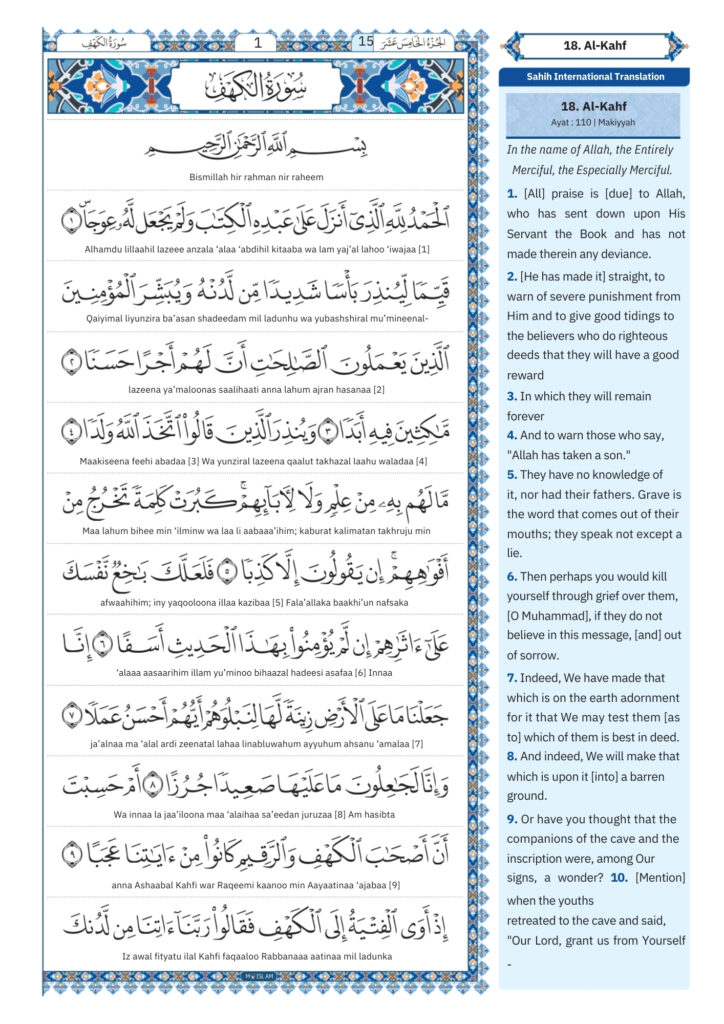


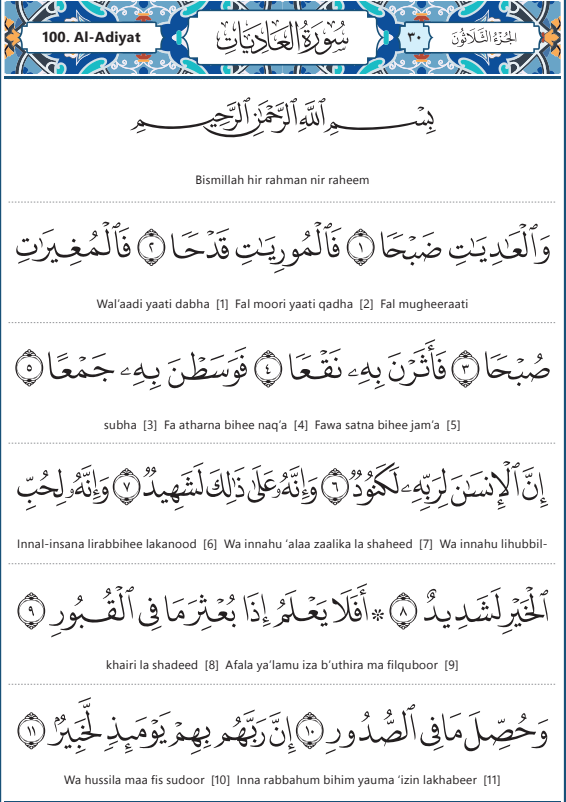
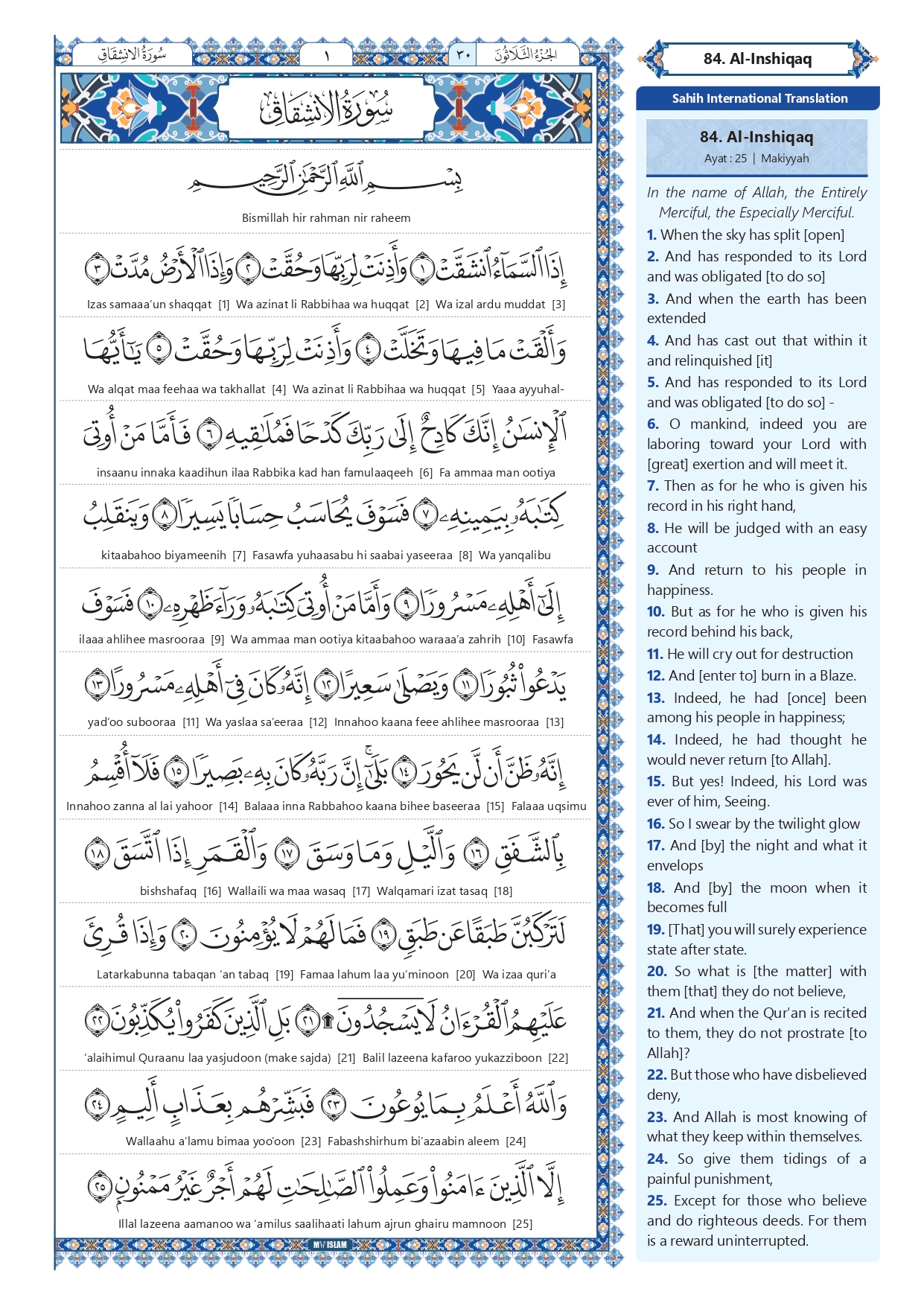
Pingback: Surah Mulk in English Transliteration: 7 Powerful Benefits & an Inspiring Guide to Learn -
Pingback: surah kahf in English pdf: A Comprehensive Guide for Non-Arabic Speakers -
Pingback: Surahs to Read After Fajr: Spiritual Uplift and Morning Blessings -